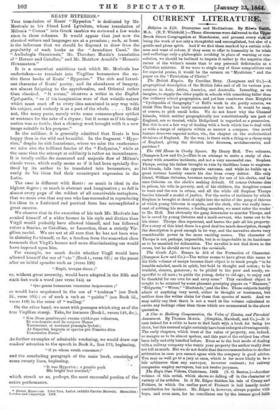KEATS' HYPERION.*
THIS translation of Keats' " Hyperion " is dedicated by Mr. Merivalo to his friend Lord Lyttelton, whose translation of Milton's "Comas" into Greek iambics we reviewed a few weeks sinoe in these columns. It would appear that just now the classical writers and languages are at a premium ; such, at least. is the inference that we should be disposed to draw from the popularity of such books as the " Arundines Cami," the " Anihologia Oxoniensis," Mr. Theodore Martin's translation of " Horace and Catullus," and Mr. Matthew Arnold's " Homeric Hexameters."
It is a somewhat ambitious task which Mr. Merivale has undertaken—to translate into Virgilian hexameters the en- tire three books of Keats' " Hyperion." The rich and luxuri- ant character of Keats' poetry, and its abundance of imagery, are almost fatiguing to the apprehension, and Oriental rather than classical. " It seems," observes a writer in the English Cyclopedia, " as if his imagination were of that volatile nature which must start off to every idea associated in any way with
his subject, and embody it as a part of the whole He did not, like many poets, merely write some common-place epithet or sentence for the sake of a rhyme ; but it seems as if his imagi- nation was so fertile, that a chiming word brought with it a new image suitable to his purpose."
In the sublime, it is generally admitted that Keats is less happy than in the wild and beautiful. In the fragment " Hype- rion," despite its rich luxuriance, where we miss the exuberance we miss also the brilliant fancies of the " Endymion," while at the same time the attempt at sublimity is rather an incumbrance. It is totally unlike the measured and majestic flow of Milton's classic verse, which really seems as if it had been specially des- tined by its author to be translated into hexameters, so easily do his ideas find their counterpart expression in the Latin.
The case is different with Keats : so much is ideal in the highest degree ; so much is abstract and imaginative ; so full is almost every page of the wildest of all conceivable metaphors, that we must own that any one who has succeeded in reproducing his ideas in a Latinized and poetical form has accomplished a great success.
We observe that in the execution of his task Mr. Merivale has availed himself of a wider licence in his style and diction than Virgil would probably have allowed himself, and has followed rather a Statian, or Catullian, or Lucretian, than a strictly Vir- gilian model. We are not at all sure that he has not been wise in claiming for himself, so far, a freedom from the somewhat close trammels that Virgil's keener and more discriminating ear would have imposed upon him.
For example, we much doubt whether Virgil would have allowed himself the use of " clo " (Book i., verse 95) ; or the pause after an initial spondee such as (verse 126)
" Rupit, tresque duces ;"
or, without great necessity, would have adopted in the fifth and sixth feet such a word (see verse 144) as
" Quo genus humanum venerator lueiparentem ;"
or would have acquiesced in the use of " tonitrus " (see Book iii., verse 104) ; or of such a verb as " quirito " (see Book iii., verse 110) in the sense of " wailing."
On the other hand, we meet with passages which ring as of the true Virgilian stanigi. Take, for instance (Book i., verses 148, &c.),
" Non ilium gemitasque canum stridorque volnerum, Et conclamato noti de corpore Manes Terruerant, et nocturni prtesagia lychni ; At Superem Anguria of species pro Numine dine Concussere Deum."
As further examples of admirable rendering, we would draw our readers' attention to the speech in Book ii., line 173, beginning, " 0 ye whom wrath consumes ;"
and the concluding paragraph of the same 'book, consisting of some twenty lines, beginning,
"It was Hyperion ; a granite peak His bright feet touched,"
which struck us as, perhaps, the most successful portion of the entire performance.
• 'rectal Hype/Ionia Libri Tree, Leine, reddidit Carolas Merirale. Macmillan : London and Cambridge. 1863.


































 Previous page
Previous page